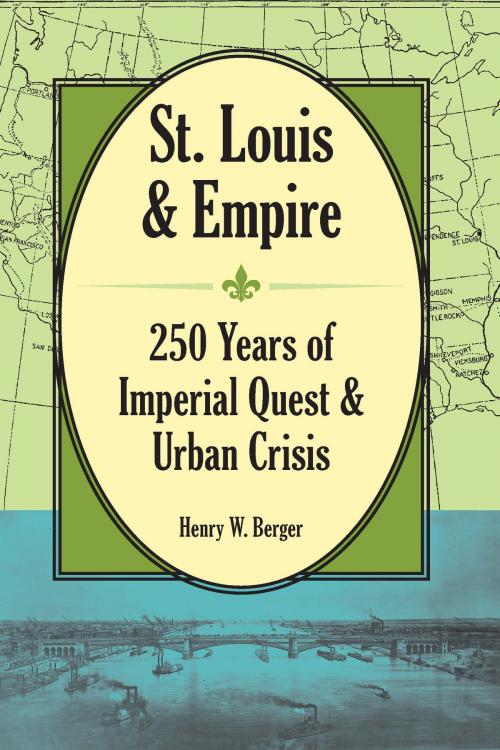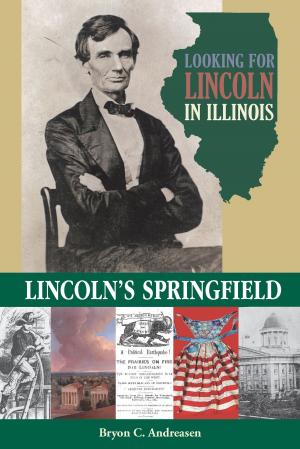St. Louis and Empire
250 Years of Imperial Quest and Urban Crisis
Nonfiction, History, Americas, United States, 19th Century| Author: | Henry W Berger | ISBN: | 9780809333967 |
| Publisher: | Southern Illinois University Press | Publication: | April 23, 2015 |
| Imprint: | Southern Illinois University Press | Language: | English |
| Author: | Henry W Berger |
| ISBN: | 9780809333967 |
| Publisher: | Southern Illinois University Press |
| Publication: | April 23, 2015 |
| Imprint: | Southern Illinois University Press |
| Language: | English |
At first glance, St. Louis, Missouri, or any American city, for that matter, seems to have little to do with foreign relations, a field ostensibly conducted on a nation-state level. However, St. Louis, despite its status as an inland river city frequently relegated to the backwaters of national significance, has stood at the crossroads of international matters for much of its history. From its eighteenth-century French fur trade origins to post–Cold War business dealings with Latin America and Asia, the city has never neglected nor been ignored by the world outside its borders. In this pioneering study, Henry W. Berger analyzes St. Louis’s imperial engagement from its founding in 1764 to the present day, revealing the intersection of local political, cultural, and economic interests in foreign affairs.
Berger uses a biographical approach to explore the individuals and institutions that played a leading role in St. Louis’s expansionist reach. He shows how St. Louis business leaders, entrepreneurs, politicians, and investors—often driven by personal and ideological motives, as well as the potential betterment of the city and its people—looked to the west, southwest, Latin America, Europe, Asia, and the Pacific to form economic or political partnerships. Among the people and companies Berger profiles are Thomas Hart Benton, who envisioned a western democratic capitalist empire hosted by St. Louis; cotton exporters James Paramore and William Senter, who were involved in empire building in the southwest and Mexico; St. Louis oil tycoon and railroad investor Henry Clay Pierce, who became deeply involved in political intrigue and intervention in Mexican affairs; entrepreneur and politician David R. Francis, who promoted personal and St. Louis interests in Russia; and McDonnell-Douglas and its founder, James S. McDonnell Jr., who were part of the transformation of St. Louis’s political economy during the Cold War.
Many of these attempted imperial activities failed, but even when they succeeded, Berger explains, the economy and the people of St. Louis did not usually benefit. The vision of a democratic capitalist empire embraced by its exponents proved to be both an illusion and a contradiction. By shifting the focus of foreign relations history from the traditional confines of nation-state conduct to city and regional behavior, this innovative study highlights the domestic foundations and content of foreign policy, opening new avenues for study in the field of foreign relations.
At first glance, St. Louis, Missouri, or any American city, for that matter, seems to have little to do with foreign relations, a field ostensibly conducted on a nation-state level. However, St. Louis, despite its status as an inland river city frequently relegated to the backwaters of national significance, has stood at the crossroads of international matters for much of its history. From its eighteenth-century French fur trade origins to post–Cold War business dealings with Latin America and Asia, the city has never neglected nor been ignored by the world outside its borders. In this pioneering study, Henry W. Berger analyzes St. Louis’s imperial engagement from its founding in 1764 to the present day, revealing the intersection of local political, cultural, and economic interests in foreign affairs.
Berger uses a biographical approach to explore the individuals and institutions that played a leading role in St. Louis’s expansionist reach. He shows how St. Louis business leaders, entrepreneurs, politicians, and investors—often driven by personal and ideological motives, as well as the potential betterment of the city and its people—looked to the west, southwest, Latin America, Europe, Asia, and the Pacific to form economic or political partnerships. Among the people and companies Berger profiles are Thomas Hart Benton, who envisioned a western democratic capitalist empire hosted by St. Louis; cotton exporters James Paramore and William Senter, who were involved in empire building in the southwest and Mexico; St. Louis oil tycoon and railroad investor Henry Clay Pierce, who became deeply involved in political intrigue and intervention in Mexican affairs; entrepreneur and politician David R. Francis, who promoted personal and St. Louis interests in Russia; and McDonnell-Douglas and its founder, James S. McDonnell Jr., who were part of the transformation of St. Louis’s political economy during the Cold War.
Many of these attempted imperial activities failed, but even when they succeeded, Berger explains, the economy and the people of St. Louis did not usually benefit. The vision of a democratic capitalist empire embraced by its exponents proved to be both an illusion and a contradiction. By shifting the focus of foreign relations history from the traditional confines of nation-state conduct to city and regional behavior, this innovative study highlights the domestic foundations and content of foreign policy, opening new avenues for study in the field of foreign relations.















